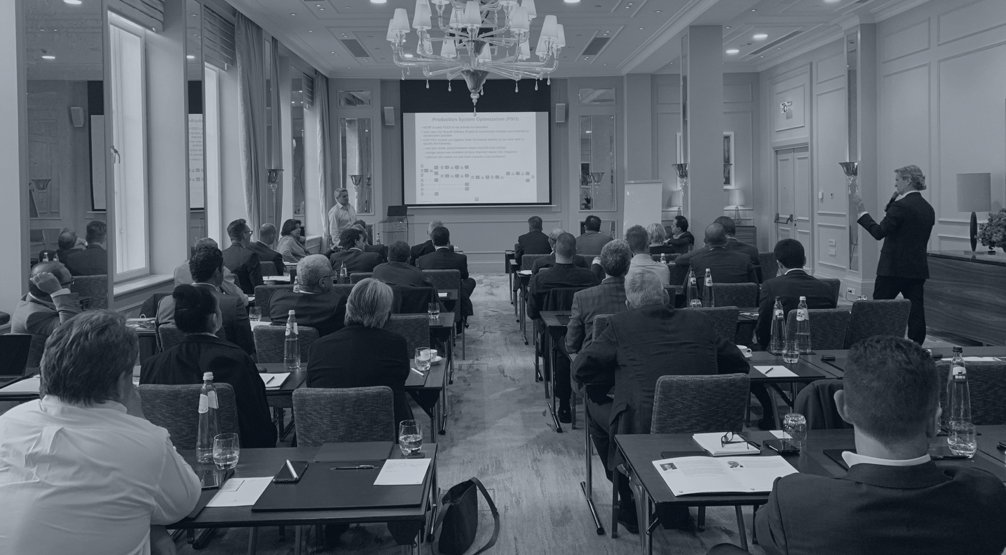
To further explore how Project Production Management (PPM) can transform project delivery, the Project Production Institute (PPI) hosted its 2019 European Symposium on September 5th in Amsterdam.
The first of its kind to be held outside of San Francisco, this Symposium brought together a broad cross-section of leading companies from throughout Europe and the Middle East. Along with PPI knowledge partner McKinsey & Company, around sixty attendees from companies such as Chevron, DSM, GSK, Royal Dutch Shell, Saudi Aramco, Tata Steel and Technip FMC convened at the Waldorf Astoria Amsterdam for a full day of presentations, research and perspectives on the opportunity of Project Production Management (PPM), as well as how to successfully adopt PPM practices.

Jim Craig, Manager of Project Production Management & Innovation at Chevron Project Resources Company, kicked off the Symposium with a presentation on Chevron’s PPM Journey. Craig explained that the engineering & construction industry is in crisis and thus transforming project delivery is imperative. He observed that a project is an unrecognized production system, and thus should be treated as a product as in manufacturing. Chevron has three legs to its approach to implementing PPM: Production System Optimization (PSO) to map and model the projects, Production Engineering (PE) as the method to design and fabricate how the work should get done, and Project Production Control (PPC) to control how the work is executed. Key learnings that were shared as part of Chevron’s journey to implement PPM on projects were that strong leadership is imperative to help change the mindset and that contractors are entrenched in Era 1 and Era 2 thinking, as they tend to focus on the reporting and forecasting rather than on control of the work. Chevron’s journey to better project delivery is about entering a new Era of profitability.
Dr. Ram Shenoy, Executive Director of PPI, delivered a presentation on the business case for PPM. With 98% of projects not meeting their stated objectives, the current poor project delivery is bad for business in multiple ways, including too much work in process (WIP) which reduces return on capital employed, ties up nonproductive cash in the system and increases cycle time. Todd Zabelle, founder and CEO of Strategic Project Solutions, Inc. spoke further about this gap in the engineering and construction industry. He explained that in the world of projects, we don’t recognize Operations Science, which has created a technical gap in project delivery. There are three main components to PPM which include Operations Science as the framework, digital as the enabler and neuroscience to help deal with underlying mental models to facilitate adaptation. To better understand and influence project outcomes, an introduction to Operations Science fundamentals and the technical framework were explained in-depth by the Institute’s Technical Director, Dr. Mark Spearman.
To show real-life case examples of how PPM is applied to projects, Wim Leenhouts, Chief Process Engineer and Global Discipline Head of Process Engineering for Royal Dutch Shell, spoke about how Shell implemented PPM on its Gulf Coast GTL Project. Because the project was too complex and dynamic for centralized scheduling, Shell utilized PPM to optimize and control the work. He explained that with PPM, a fast feedback loop on project performance created continuous improvement with higher commitment reliability as well as the ability to understand root causes of commitment unreliability to be able to systematically and quickly address these issues. This production planning approach invokes discipline, while providing the flexibility necessary for the front-end work. Roberto Arbulu, Vice President of Technical Services at SPS, then spoke on effective supply control and the importance of synchronizing supply with site demand.
Jim Craig and Craig Evans of Chevron also spoke about their experience applying PPM principles to Chevron projects. They explained that utilizing Project Production Engineering enabled them to model upfront – before they had even left the “home office,” they had identified numerous technical issues and opportunities that they were able to address before construction even began. Project Production Control then enabled the system to behave in accord with the planned workflow. The teams saw that they interacted with more disciplines than they realized and that they did not really understand how the complex workflows actually were completed. By using PPC, Chevron has reduced Work In Process, improved throughput and reduced cycle time for improved project delivery.
Furthermore, Dr. James Choo of Strategic Project Solutions explained the relationship between PPM and digital technologies. As $1.5 trillion is currently being invested in digitization, it is imperative to understand the impact this will have, specifically on projects. The issue is that if we don’t understand what problem we are trying to solve, we cannot digitize the right solutions. Dr. Choo also laid out how Operations Science and Artificial Intelligence / Machine Learning are connected, as this digital technology will not only track but also control supply and demand so that a production system behaves in accordance. The Symposium was capped off with a presentation by Jan Koeleman of McKinsey & Company on championing PPM by explaining how it puts science in projects. Koeleman concluded that PPM allows us to predict the behavior of projects, by being able to model processes within a specific project context. Such predictive modeling capabilities allow one to develop a project performance baseline, model interventions and quantify the benefit based on cost and schedule of those interventions.
Throughout the Symposium, attendees, presenters and practitioners alike explored how PPM principles and applications could provide real and measurable methods to improve project delivery today.